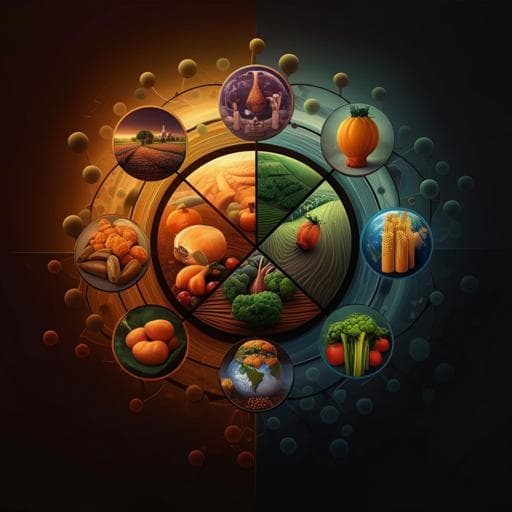
Agriculture
Effect of COVID-19 on agricultural production and food security: A scientometric analysis
C. C. Okolie and A. A. Ogundeji
This fascinating study by Collins C. Okolie and Abiodun A. Ogundeji delves into the profound effects of COVID-19 on agricultural production and food security, revealing a staggering 56.64% annual growth rate in research output during the pandemic. Discover how the disruptions influenced the essential pillars of food security across the globe!
~3 min • Beginner • English
Introduction
The COVID-19 pandemic created an unprecedented global disruption beginning in late 2019, with governments imposing stringent measures (e.g., lockdowns) to curb spread. These measures and the disease itself have affected economies worldwide and disproportionately impacted populations vulnerable to poverty and hunger. The agricultural production sector—central to the food chain—experienced severe constraints, notably through restrictions on labor mobility, leading to shortages of migrant labor and reduced production efficiency (examples include delays in sowing in parts of China, hampered harvesting in India, and losses/inputs shortages among Ethiopian vegetable farmers). Such interruptions in agricultural food supply induce supply and demand shocks with immediate and long-term implications for the agricultural economy and food security. Food security—defined as continuous physical and economic access to sufficient, safe, and nutritious food—has been jeopardized directly by destabilized food systems and indirectly via lockdown-induced income and access constraints. The pandemic negatively impacted all four pillars of food security: availability, access, utilization, and stability. Reports by FAO, WTO, and WHO warned of global food shortages due to supply chain interruptions, with global trade contracting sharply in 2020 and large increases in extreme poverty and food insecurity. Despite growing literature on COVID-19, agricultural production, and food security, a comprehensive scientometric assessment mapping the state of knowledge on the effect of coronavirus on agricultural production and food security (ECAP-FS) was lacking. This study addresses that gap by examining ECAP-FS research output, prolific authors, collaborative nations, co-citation and collaboration networks, and keyword trends using bibliometric methods, and by proposing a four-stage process to merge WoS and Scopus datasets for robust analyses.
Literature Review
Existing studies have examined COVID-19’s effects on food security and separately on agricultural production, documenting disruptions in supply chains, labor shortages, and economic stressors influencing household food access and nutrition. However, few works comprehensively assessed and mapped the ECAP-FS literature. The authors highlight that one database alone (WoS or Scopus) is insufficient to capture the full scope of knowledge and trends; hence, the need to merge datasets for a more complete scientometric portrait. The review identifies a gap in synthesized understanding of prolific contributors, collaborative patterns across nations and institutions, dominant themes, and the evolution of research topics linking COVID-19, agriculture, and food security.
Methodology
Design: Scientometric/bibliometric analysis and systematic review following Tranfield et al. (2003), using two databases (Web of Science and Scopus). Period: Publications between 2016 and April 2021. Language: English only. Document type: Journal articles, final publication stage (excluding articles in press). Subject areas prioritized included Environmental Science, Social Sciences, Agricultural and Biological Sciences (per Table 1). Search Strategy: Title-based search strings to maximize precision and sensitivity. Example strings (Table 2): WoS: Title((((("impact*" OR "effect*") AND ("coronavirus" OR variants incl. "covid*", "SARS-CoV-2", "2019-nCoV") AND ("agricultural production*") AND ("food security*")))))), yielding 9 records. Scopus: Title("impact*" OR "effect*") AND of ("coronavirus" OR variants incl. "covid*", "SARS-CoV-2", "2019-nCoV") AND ("agricultural production*") AND ("food security*"), yielding 421 records. Screening and Eligibility: Multi-stage process—identification, screening, eligibility—applied inclusion/exclusion criteria (Table 1). From WoS: 9 identified, 2 excluded; 7 assessed; 1 excluded for irrelevance. From Scopus: 421 identified, 203 excluded; 218 assessed; 46 excluded for irrelevance. Merging and De-duplication: Merged WoS and Scopus records; duplicates removed (n=4). Final sample: 174 articles. Tools and Processing: Data exported in BibTeX from WoS and Scopus. Conversion and merging executed in R/RStudio (v4.0.3) using bibliometrix: convert2df for each source (dbsource = "isi" or "scopus"), mergeDbSources(f1, f2, remove.duplicated = FALSE), and duplicate detection via duplicatedMatching(j, Field = "TI", tol = 0.95). Visualization: VOSviewer (via net2VOSviewer in R) for keyword co-occurrence networks, author coupling, and university/nation collaboration networks. Analytical Parameters: Co-occurrence threshold for author keywords set to 10; of 708 author keywords, 30 met the threshold and were visualized into clusters. Descriptive indicators included publication counts by year, citations, authorship metrics, Lotka’s law parameters, and country-level SCP/MCP metrics.
Key Findings
- Corpus and Growth: 174 articles (2016–Apr 2021) across 90 journals; annual growth rate ≈56.64%. Publication distribution: 2016: 7; 2017: 6; 2018: 13; 2019: 15; 2020: 67 (38.5%); 2021: 66 (37.9% as of April). Average years from publication: 1.12. Average citations per document: 6.023; average citations per year per document: 1.825. - Authorship/Collaboration: 851 authors; 4.89 authors/document; co-authors/document 5.23; collaboration index 5.1. Nine single-authored documents; 842 authors in multi-authored documents. Lotka’s law parameters: constant 0.70, beta 3.88; KS goodness-of-fit 0.94. - Prolific Authors (Table 6): Most productive—Gong B (6 papers, 3.45%). Next: Baudron F, Peng W, Zhang S (3 each; 1.7%). Seventeen authors had 2 papers each. - Top Cited Articles (Table 7): Foyer et al. 2016 (Nature Plants)—244 citations; Hart et al. 2018 (Functional Ecology)—60; Smiraglia 2016 (Environmental Research)—52; Millar 2016 (Oecologia)—43; Tesfahunegn 2016 (Applied Geography)—42; KC et al. 2018 (PLoS One)—39; Pu & Zhong 2020 (Global Food Security)—23; Provenza 2019 (Frontiers in Nutrition)—21; others listed with 12–17 citations. - Countries—Corresponding Authors (Table 8): China (28; MCP ratio 0.214), USA (19; 0.526), UK (12; 0.250), Italy (9; 0.444), Spain (8; 0.125), Australia (5; 0.600), India (5; 0.600), Mexico (5; 0.600), Germany (4; 0.750), Canada (3; 0.667), Korea (3; 1.000), France (2; 1.000), others with 2 each. - Citations by Nation (Table 9): Italy—112 total citations (AAC 12.44), China—107 (3.82), USA—81 (4.26), UK—76 (6.33), Ethiopia—47 (23.50), Canada—40 (13.33), Mexico—22 (4.40), Germany—21 (5.25), France—18 (9.00), Spain—18 (2.25), India—17 (3.40), others follow. - Sources (Table 10): Most relevant journals—Sustainability (Switzerland) (23 papers), Agricultural Systems (13), Journal of Cleaner Production (10), Global Food Security (8), Science of the Total Environment (8), Land (5), Food Security (4), IJERPH (4), PLoS One (4), Environmental Research (3), Journal of Integrative Agriculture (3), Land Use Policy (3), others (2 each). - Keywords (Table 11): Author keywords—COVID-19 (27; 15.5%), Food Security (25; 14.4%), Agriculture (18; 10.3%), Climate Change (9; 5.2%), Resilience (9; 5.2%), Ecosystem Services (8; 4.6%), Food Systems (5; 2.9%), Sustainable Development (5; 2.9%), Agricultural Production (4; 2.3%), Biodiversity (4; 2.3%), China (4; 2.3%), COVID-19 Pandemic (4; 2.3%), Food Supply Chain (4; 2.3%), India (4; 2.3%), Land Take (4; 2.3%), Life Cycle Assessment (4; 2.3%), Nutrition (4; 2.3%), Sustainability (4; 2.3%), Conservation (3; 1.7%), Dietary Diversity (3; 1.7%). Keywords-Plus—Food Security (35; 20.1%), Agricultural Production (28; 16.1%), Agriculture (28; 16.1%), Food Supply (27; 15.5%), Climate Change (26; 14.9%), Human (20; 11.5%), Article (19; 10.9%), Food Production (19; 10.9%), China (18; 10.3%), Sustainable Development (16; 9.2%), Land Use (15; 8.6%), Agricultural Robots (14; 8.0%), COVID-19 (14; 8.0%), Biodiversity (12; 6.9%), Agricultural Land (11; 6.3%), Sustainability (10; 5.7%), Controlled Study (9; 5.2%), Cultivation (9; 5.2%). - Network Analyses: Author coupling shows at least 18 interconnections among top 20 authors. Nation collaboration (top 27 countries): USA had 17 collaboration paths; China 10; Australia 8; UK 8; Canada 5; Netherlands 4; Germany 4; South Africa 4; Uganda 3; India 3; several others had 1–2. University collaboration: strongest networks included Wageningen University (Netherlands), China Agricultural University, Zhejiang University, University of Pretoria (South Africa); also University of Western Australia, University of Leeds, University of Alberta, University of Sydney, Case Western Reserve University, Chinese University of Hong Kong, International Crop Research Institute; University of Oxford showed no collaboration in this corpus. - Thematic Clusters (co-occurrence): Three clusters identified—(1) Blue: COVID-19, Food Supply, Food Production, China, Food Security, Agricultural Production; (2) Red: Agricultural Land, Catering Services, Environmental Protection, Humans, Meat, Food Industry, Article, Female, Priority Journal, Procedures, Controlled Study, Environmental Sustainability; (3) Green: Economic and Social Effects, Agriculture, Agricultural Robots, Sustainable Development, Climate Change, Land Use, Greenhouse Gases, Ecosystem, Biodiversity. - Substantive Conclusion from Mapping: Interruptions in agricultural food supply due to COVID-19 created supply and demand shocks with negative impacts across all four pillars of food security.
Discussion
The scientometric mapping addresses the research objective by quantifying and visualizing the evolution, structure, and thematic focus of ECAP-FS research. The sharp rise in publications (especially 2020–2021) reflects heightened global concern over pandemic-induced disruptions to agriculture and food systems. Authorship and collaboration metrics indicate predominantly multi-authored, internationally collaborative research, with strong contributions from China, the USA, the UK, and Italy. Network analyses reveal central countries and institutions that anchor collaborative structures, while limited participation from African institutions highlights regional disparities in research capacity and integration. Keyword co-occurrence and clusters converge on core themes—COVID-19, food security, agriculture, climate change, and sustainability—underscoring the multidimensional impacts of the pandemic on food system components (production, supply chains, access, nutrition) and their interaction with existing stressors like climate change. The findings corroborate the conceptual understanding that COVID-19 affected all four pillars of food security by constraining production and logistics and depressing household incomes and access. The mapping also identifies journals and communities where ECAP-FS knowledge is concentrated, providing a roadmap for future cross-disciplinary engagement and targeted funding to underrepresented regions.
Conclusion
There has been an exponential and concentrated increase in ECAP-FS publications during 2016–April 2021, especially in 2020–2021, driven largely by researchers in China, the USA, and the UK. The analysis identifies prolific authors, leading journals (e.g., Sustainability, Agricultural Systems, Journal of Cleaner Production), and central collaboration hubs (e.g., Wageningen University, China Agricultural University, Zhejiang University, University of Pretoria). The predominant themes center on COVID-19, food security, agriculture, climate change, sustainability, and agricultural production. Empirically, the synthesis supports that COVID-19 disruptions generated supply and demand shocks with adverse effects on all four pillars of food security. Notably, African contributions were relatively limited, suggesting opportunities to strengthen research networks and funding in the region. Future research should expand data sources beyond WoS and Scopus, consider broader document types and non-English literature, and deepen analysis of regional vulnerabilities, supply chain resilience, and policy responses to pandemic-related shocks.
Limitations
- Data sources limited to two databases (WoS and Scopus). - Stringent keyword strategy and title-based search may omit relevant studies using different terminology. - Excluded document types (conference papers, book chapters, reviews, abstracts, notes) and non-English publications (e.g., French, Dutch, Chinese), potentially biasing coverage. - Snapshot period through April 2021; subsequent publications may alter findings. - Reliance on bibliometric indicators may not capture qualitative nuances of study designs and impacts.
Related Publications
Explore these studies to deepen your understanding of the subject.







